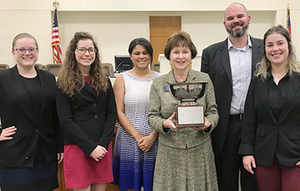
In a close competition, Catawba College bested Wake Forest University in the finals of North Carolina Independent Colleges and Universities (NCICU) 8th Annual Ethics Bowl. The theme for this year was Ethics in the Environment, and the topic for the finals round was “Sunscreen and the Environment.”
Catawba had faced Barton College in the semifinals, as Wake Forest faced Meredith College. The case for that round was “Nuclear Energy as an Ethical Energy Source.”
Catawba students participating included Cassandra “Cassie” James, a Politics major from Robbins, N.C.; Eleanor King, an Environment & Sustainability major from Matthews, N.C.; Hannah Ryan, double majoring in Politics and Economics & Finance and from Roseanna, Australia; and Bryana Eller, also an Environment & Sustainability major from Randleman, N.C. Dr. Norris T. Feeney, an assistant professor of Politics, is serving as the Catawba team’s campus coordinator.
Dr. Feeney attributes the success of this year’s Catawba team that included returning member Cassandra James, and first-time participants Eleanor King, Hannah Ryan, and Bryana Eller, to the fact that the team members enjoyed each other’s company and exhibited strong teamwork skills throughout the event. He says the attitude of Catawba’s team also contributed to the team’s victories as they remained positive and had fun during the overall event, which served to balance against the stress and intense focus demonstrated during the rounds. He notes the role that “good fortune also played.”
“Each round was scored extremely closely between Catawba and the opposing team,” he recalls. “In my five years as a campus coordinator, Catawba College has not previously seen as many 2-1 decisions in the preliminary rounds, and the points separating teams in each round have never been fewer than in this year’s event.
“I hope our campus community recognizes that this year’s success would be impossible without the willingness of excellent Catawba students, who already have considerable commitments across campus, to sacrifice additional time and energy to prepare over several months for this annual event. In the week leading up to this year’s event, the team made great strides as they more effectively incorporated ethical theory into their responses to cases highlighting Ethics in the Environment.”
“The commitment of our students as ethical, caring stewards of the environment was evident today in their presentations ranging from nuclear energy to protection of our oceans and rivers,” said NCICU President Hope Williams on February 9 following the competition. “Their knowledge and understanding of the issues give me great faith in these future leaders.”
Twenty-two of North Carolina’s private colleges competed in the event which was held at the North Carolina Legislative Complex in Raleigh February 8 and 9. More than 60 corporate, nonprofit, legislative and community leaders served as judges and moderators for the two-day event.
Each Ethics Bowl team consists of four-to-six students. A campus coordinator works with the students to prepare them for the competition which consists of four rounds over the two-days, plus semi-final and final rounds. In each round, a specially developed case study outlining a complex ethical situation related to the environment was presented to the teams for debate. The round was awarded to the team that made the most sound, persuasive presentation. Approximately 60 business, non- profit and government professionals served as judges and moderators.
The Ethics Bowl was made possible by Presenting Sponsors Duke Energy and Wells Fargo Bank; Benefactor, BB&T; and 25 corporate Associate sponsors. In addition to Catawba College and the other aforementioned institutions, NCICU member colleges and universities participating in this year’s Ethics Bowl included Belmont Abby College, Campbell University, Chowan University, Gardner-Webb University, High Point University, Johnson C. Smith University, Livingstone College, Louisburg College, Mars Hill University, Montreat College, North Carolina Wesleyan College, Queens University of Charlotte, St. Andrews University, Saint Augustine’s University, Salem College, University of Mount Olive, William Peace University, and Wingate University.
